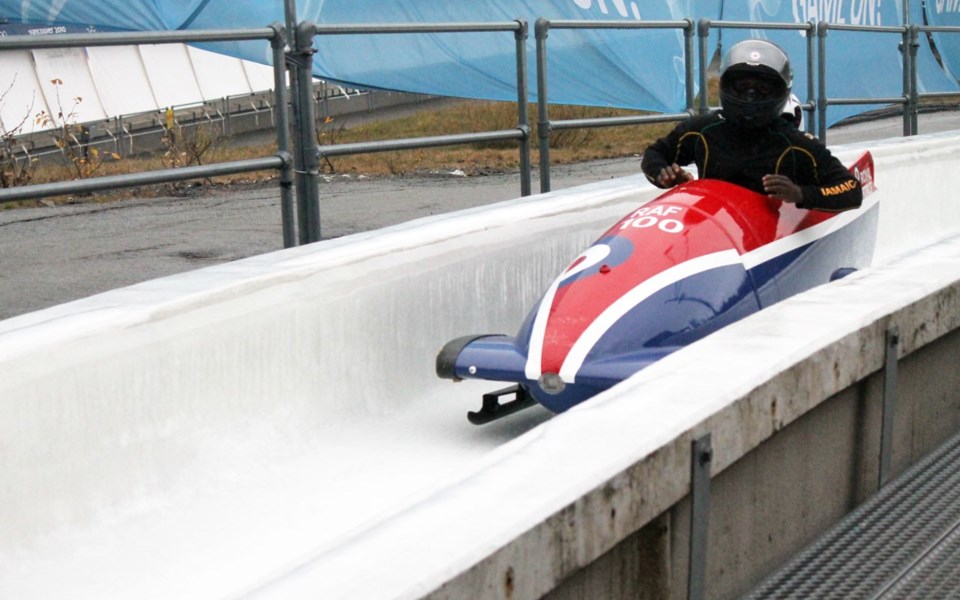At the 2018 Winter Olympic Games this past February, four teams competing at South Korea's Alpensia Sliding Center could pinpoint their origin stories to their participation at the International Bobsleigh and Skeleton Federation's (IBSF) Emerging Nations camp in the previous quadrennial.
The Olympians hailed from Ghana, Australia, Jamaica and Brazil, with some graduates taking part in the camp twice, while some were there for a full four years.
This year, the Emerging Nations program started the process anew with its annual camp at the Whistler Sliding Centre earlier this month. The program welcomes athletes from countries without their own sliding infrastructure and provides coaching through the IBSF.
Nicola Minichiello, the IBSF's North American coordinator, explained that this year, especially, the athletes have rawer skills after being recruited from other sports ranging from rugby and rowing to track and field and hockey. Minichiello noted the athletes are selected by their respective national federations to enter the program and are then sent to Whistler to be moulded in the ways of bobsleigh or skeleton.
This year's camp featured athletes from the Netherlands, Norway, Romania, Australia, Ghana, Luxembourg, Brazil and Jamaica.
"Every year, we learn something new about how we can prepare the athletes and prepare the individuals, especially people from the more exotic countries," she said. "It's really about helping them adapt to the lifestyle.
"Typically, the cold (is an adjustment)."
Minichiello, a women's bobsleigh World Champion who joined the IBSF in 2014 after retiring as an athlete, explained that while the fundamental philosophies of bobsleigh and skeleton haven't changed, being in Whistler has given athletes a chance to learn how a track can evolve and the effects that those changes can have on racers. The athletes, too, seem to enjoy the chance to learn their new trade on the world's fastest course.
"This is the perfect track to be at," she said. "It's got an awesome combination of corners, of speed, of difficulty and they're really able to develop their skills."
Sometimes, there are athletes coming from sports with far less equipment, such as track athletes who need little more than their clothing. Therefore, getting used to safely transporting big, heavy sleds can be a culture shock.
"They have to lift it all, they have to prepare it all," Minichiello said, adding that teams sometimes have to drive from one location to another, such as from Calgary to Whistler, because of the equipment. "And you're doing all that in the cold, yet."
One key, Minichiello explained, is some athletes are still relatively new to the sport, and are taking off from lower-start heights until they feel comfortable from the World Cup levels.
Jamaican pilot Shanwayne Stephens and brakeman Nimroy Turgott were among the teams training at the WSC. Stephens was born in Jamaica, moved to the United Kingdom as a child and joined the Royal Air Force, from which he was recruited. Turgott, meanwhile, was a track athlete and is now working with a pilot he feels could develop into one of the best in the world this year in his second time at the Emerging Nations camp.
Turgott said his sport background provides speed, while Stephens' air-force experience has afforded him the necessary focus and attention to detail in order to succeed.
Both were ecstatic with the progress they've made thus far after competing on the North American Cup circuit in 2017-18, and feel that with more blood, sweat and tears could eventually work their way up to contend at higher levels.
"No matter where you're from, you can be part of something brilliant," Stephens said.
While adjusting to a brand-new athletic lifestyle is a major thrust of the camp for athletes, they learn not just about the culture of sliding sports, but of one another as well.
"It's a real melting pot," Minichiello said. "It's fantastic and really helps go along with the principles and philosophies of the Olympics."
The Jamaican sledders agreed, recalling regular events where one country's representatives would host the others for an evening of cuisine and culture, fondly recalling hosting their own and attending one put on by the Brazilian contingent.
Most of the athletes from the camp are expected to remain in Whistler to train at the sliding centre for the next couple of weeks in preparation for the North American Cup races at the track from Nov. 7 to 10.




